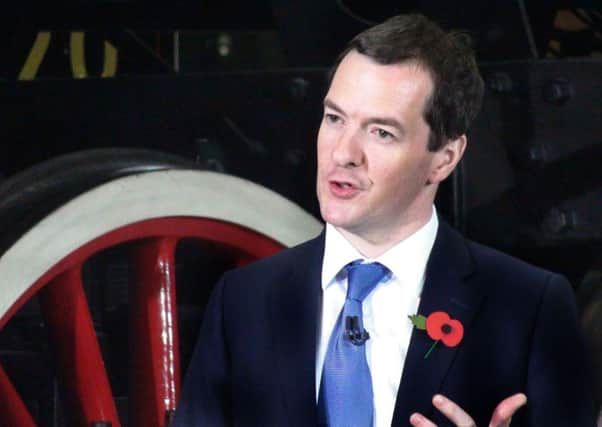Osborne: Northern rail connections key priority of new commission


The Chancellor George Osborne launched the National Infrastructure Commission inside the National Railway Museum in York this morning, and said the Government was setting aside £100billion over the remainder of this parliament which will initially be focused on modernising transport links in the North and in London, and meeting future energy needs as power stations go offline in the coming years.
The commission will additionally look at communications and flood defence infrastructure and in doing so eight commissioners will collect evidence from stakeholders and report their findings back to government. They are also charged with holding the Government to account on delivering the subsequent projects.
Advertisement
Hide AdAdvertisement
Hide AdAn initial assessment of the country’s infrastructure needs will take a few years to complete, Mr Osborne said.
Explaining how the Government could afford such investment in the nation's infrastructure, he said: “We have the spending review in less than one month and it is only because we are making difficult decisions on day to day public spending that I am able to commit £100bn to infrastructure projects over the rest of this parliament.”
In a televised address, Mr Osborne, spoke in front of around 100 invited guests at the museum, and alongside exhibits such as the Mallard locomotive and the KF7 steam engine built in Lancashire in 1935 for export to China.
Mr Osborne’s recent focus may have been trade negotiations with the likes of China, but it was inward investment that his newly appointed Commission members have been tasked with.
Advertisement
Hide AdAdvertisement
Hide AdReferring to the trains around him as he delivered his opening speech, the Chancellor said: “All of these things were the engineering wonders of their day. They are all museum pieces now but in their day they were the most sophisticated machines of their age and they came from a time when we planned for the long term and our technology was the latest technology and our infrastructure was the greatest in the world.
“But I don’t want to be the politician who stands here and says the time when we planned for the long term is a museum piece now, and I don’t want the time when we built the greatest infrastructure in the world to be a footnote in the history books.”
He said long-term planning had been a victim of short-termism across successive governments but that Britain had now rediscovered its ambition and was “thinking big” again.
The newly formed Commission will be chaired by Labour peer and former Transport Secretary Lord Adonis who appeared alongside the Chancellor in York with fellow commissioners, the Tory grandee and former deputy prime minister Michael Heseltine and Sadie Morgan, design panel chair for the High Speed 2 rail scheme.
Advertisement
Hide AdAdvertisement
Hide AdLord Adonis said that almost 200 years after the North East of England became the birthplace of the railways, northern connectivity desperately needed to be improved to help rebalance the economy and transform the relationship between northern cities.
“Commuting between Leeds and Manchester is estimated to be 40 per cent lower in volume than might be expected in terms of their economies and proximity and that is an incredibly important factor behind the need to generate the Northern Powerhouse that the Chancellor has talked so much about," Lord Adonis said.
"If that’s going to become a reality, increasing travel capacity and cutting journey times between our cities is imperative and we now need cost-effective plans - that will be an early task for the commission, working with Transport for the North and partners across the region.
He said that as more powers were devolved from Whitehall to city regions, “relationships” between the two would become significant in delivering major infrastructure projects.
Advertisement
Hide AdAdvertisement
Hide AdLord Adonis added that too often, the UK’s ability to deliver infrastructure projects efficiently is damaged by the lack of a clear strategy that enables industries to plan effectively for the future.
"We need to look at what we can do to remedy that weakness."
The four other commissioners are Professor Tim Besley, a former member of the Bank of England's Monetary Policy Committee; Sir John Armitt, the former chair of the Olympic Delivery Authority; Bridget Roswell, the ex-chief economist to the Greater London Authority; Sir Paul Ruddock, chairman of the Victoria & Albert Museum, and neuroscientist Demis Hassabis. Their first report is expected before next year’s Budget.